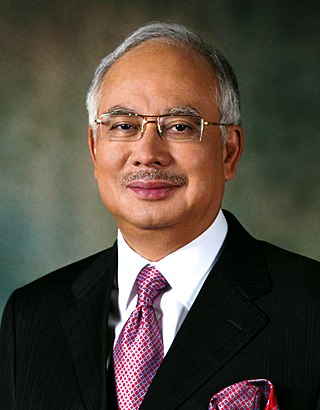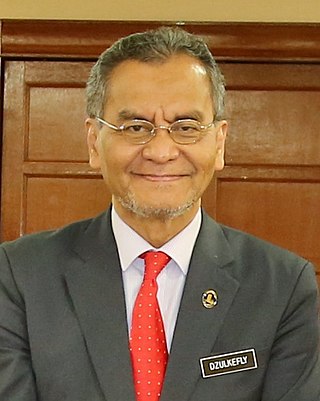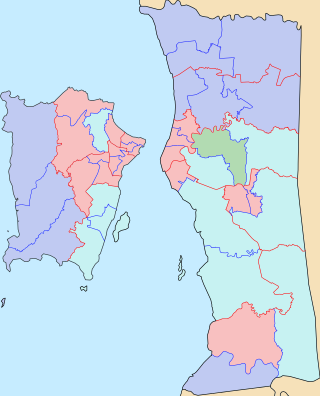The goods and services tax is a value added tax introduced in Canada on January 1, 1991, by the government of Prime Minister Brian Mulroney. The GST, which is administered by Canada Revenue Agency (CRA), replaced a previous hidden 13.5% manufacturers' sales tax (MST).
The harmonized sales tax (HST) is a consumption tax in Canada. It is used in provinces where both the federal goods and services tax (GST) and the regional provincial sales tax (PST) have been combined into a single value-added tax.

Mohammad Najib bin Tun Haji Abdul Razak is a Malaysian politician who served as the sixth Prime Minister of Malaysia from 2009 to 2018. In 2020, he was convicted of corruption in the 1Malaysia Development Berhad scandal, one of the largest money-laundering and embezzlement scandals in history. He is the son of former prime minister Abdul Razak Hussein. Najib Razak was the chairman of the Barisan Nasional (BN) coalition from April 2009 to May 2018 and the president of the United Malays National Organisation (UMNO) from November 2008 to May 2018, which had maintained control of Malaysia's government with a parliamentary majority for more than sixty years until the coalition's defeat in the 2018 general election.

Goods and Services Tax (GST) in Australia is a value added tax of 10% on most goods and services sales, with some exemptions and concessions. GST is levied on most transactions in the production process, but is in many cases refunded to all parties in the chain of production other than the final consumer.
An ad valorem tax is a tax whose amount is based on the value of a transaction or of a property. It is typically imposed at the time of a transaction, as in the case of a sales tax or value-added tax (VAT). An ad valorem tax may also be imposed annually, as in the case of a real or personal property tax, or in connection with another significant event. In some countries, a stamp duty is imposed as an ad valorem tax.
Goods and Services Tax (GST) is a value-added tax or consumption tax for goods and services consumed in New Zealand.
Goods and Services Tax (GST) in Singapore is a value added tax (VAT) of 9% levied on import of goods, as well as most supplies of goods and services. Exemptions are given for the sales and leases of residential properties, importation and local supply of investment precious metals and most financial services. Export of goods and international services are zero-rated. GST is also absorbed by the government for public healthcare services, such as at public hospitals and polyclinics.

General elections were held in Malaysia on Sunday, 5 May 2013. Voting took place in all 222 parliamentary constituencies, each electing one MP to the Dewan Rakyat, the dominant house of Parliament. State elections also took place in 505 state constituencies in 12 of the 13 states on the same day. The elections were the first since Najib Razak became Prime Minister in 2009.

Datuk Seri Dr. Dzulkefly bin Ahmad is a Malaysian politician who has served as the Minister of Health for the second term in the Unity Government administration under Prime Minister Anwar Ibrahim since December 2023 and the Member of Parliament (MP) for Kuala Selangor from March 2008 to May 2013 and again since May 2018. He served his first term as the Minister of Health in the PH administration under former Prime Minister Mahathir Mohamad from May 2018 to his resignation and the collapse of the PH administration in February 2020. He is a member and Strategic Director the National Trust Party (AMANAH), a component party of PH coalition and was a member of the Malaysian Islamic Party (PAS), a former component party of the former Pakatan Rakyat (PR) and Barisan Alternatif (BA) opposition coalitions. He has also served as the Vice President of AMANAH since December 2023.
The 2010 Air Untuk Rakyat rally was a rally held in Kuala Lumpur, Malaysia, on 5 December 2010. The rally organiser, the Air Untuk Rakyat movement and federal opposition Pakatan Rakyat, had called the protest regarding the privatisation of water management in Selangor state which surrounds the capital, Kuala Lumpur and the federal government's bailout of SYABAS, a water distribution firm controlled by associate of the UMNO-led federal government crony Rozali Ismail. A secondary objective of the rally was to hand over a petition with over 250,000 signatures to the King Tuanku Mizan Zainal Abidin to intervene against the privatisation of the water services in the state at the Istana Negara.

The following lists events from 2015 in Malaysia.
The May Day Anti-GST Rally was a rally held in Kuala Lumpur, Malaysia on May 1, 2014. The rally was organised by a coalition of 89 non-governmental organisations, including Oppressed People's Network, Parti Sosialis Malaysia, Solidariti Anak Muda Malaysia, and Asalkan Bukan UMNO among others, and was supported by the opposition Pakatan Rakyat. The rally, which coincided with International Workers' Day, was held in response to the Malaysian government's plan to introduce the goods and services tax on April 1, 2015. The rally saw participants march from Kuala Lumpur City Centre and other rally points in the city to the eventual destination, Dataran Merdeka.
The May Day Anti-GST Rally was a rally held in Kuala Lumpur, Malaysia on May 1, 2015. The rally was organised by a coalition of non-governmental organisations, including Oppressed People's Network, Parti Sosialis Malaysia, Solidariti Anak Muda Malaysia, and Asalkan Bukan UMNO among others, and was supported by the opposition Pakatan Rakyat. The rally, which coincided with International Workers' Day, was held in response to the Malaysian government's rollout of the goods and services tax from April 1, 2015. The rally saw participants march from various points in Kuala Lumpur to their eventual destination, Kuala Lumpur City Centre.

Events in 2016 in Malaysia.
The Malaysian alternative federal budget for the 2016 fiscal year was launched by Pakatan Harapan on 21 October 2015, two days before the Malaysian Budget Day, as a response to the government's federal budget.
The Malaysian federal budget for 2015 fiscal year was presented to the Dewan Rakyat by Prime Minister and Minister of Finance, Najib Razak on Friday, 10 October 2014.
The Malaysian federal budget for 2014 fiscal year was presented to the Dewan Rakyat by Prime Minister and Minister of Finance, Najib Razak on Friday, 25 October 2013.
2018 in Malaysia is Malaysia's 61st anniversary of its independence and 55th anniversary of Malaysia's formation.

A value-added tax (VAT), known in some countries as a goods and services tax (GST), is a type of tax that is assessed incrementally. It is levied on the price of a product or service at each stage of production, distribution, or sale to the end consumer. If the ultimate consumer is a business that collects and pays to the government VAT on its products or services, it can reclaim the tax paid. It is similar to, and is often compared with, a sales tax. VAT is an indirect tax because the person who ultimately bears the burden of the tax is not necessarily the same person as the one who pays the tax to the tax authorities.

The 13th Penang election was held on 5 May 2013. Polling took place in 40 constituencies throughout the State of Penang, with each electing a State Assemblyman to the Penang State Legislative Assembly. The election was conducted by the Malaysian Election Commission.









